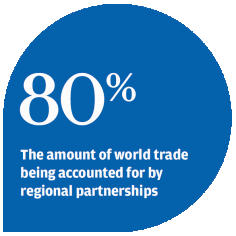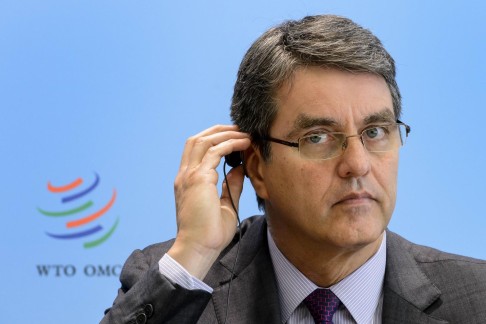
Whither the WTO?
The World Trade Organisation is still struggling to progress from more than 12 years of talks, leading to the formation of regional partnerships
Just over two weeks ago, the 20th anniversary of the deal establishing the WTO came around.

That would be churlish.
The birth of the WTO in 1994 marked a huge step forward in international trade governance - the biggest since the multilateral trading system came into being in the latter half of the 1940s.
The WTO took over from its progenitor, the General Agreement on Tariffs and Trade, with a broadened mandate and a more solid institutional footing.
The WTO needs to work on some of the things that have made it ineffectual as a negotiating body
All the public attention on the WTO's inability to close the Doha Round has blunted recognition of the contribution the global trade regime has made to prosperity and peace over more than six decades. During that time, the Gatt/WTO has contributed to more open markets, maintained a comprehensive set of trade rules and underwritten an effective system for settling hundreds of trade disputes.
The volume of trade is more than 35 times greater today than it was in 1950, and global production is nine times greater. A well-functioning trading system has helped to underpin this impressive performance.
Yet the largely results-free struggle to advance the Doha Round has lasted for more than 12 years and taken its toll on the institution's reputation.
No government will say that the WTO's days are numbered, but too few are prepared to do enough to remove the threat of terminal demise.
Weak performance on the negotiating front has dulled appreciation of how effectively the WTO has contained post-Lehman Brothers protectionism, maintained adherence to rules and contributed to the amicable settlement of disputes.
The WTO has failed to make more progress in the Doha Round in part because the negotiating effort has coincided rather precisely with shifting power in the world economy.
Between 1980 and 2000, industrial countries accounted for about 70 per cent of world income while emerging economies took a 20 per cent share. By 2012, the numbers were 57 per cent and 30 per cent, respectively.
In the case of trade, the industrial countries' share dropped from 82 per cent to 70 per cent and the emerging economies' share rose from 14 per cent to 23 per cent.
The rapidity of these changes has been remarkable. Such shifts in economic heft strain international governance and challenge pre-existing power configurations. Adjustment can be difficult.
Successful negotiations on trade inevitably require agreement on the balance of rights and obligations among nations. Compromise on this fundamental reality has proven frustratingly elusive.
Failure to make significant progress at the multilateral level has induced many governments to take refuge in preferential trade deals. Among other things, these help to soften the impact of shifting power and defer the need to manage emerging geopolitical rivalries.

Optimists believe the mega-regionals will not only consolidate and extend beneficial integration among the parties involved but also buy time to tame geopolitical rivalry and act constructively on common global interests. Some even hope that these big initiatives, covering more than 80 per cent of world trade, will simply coalesce around a rejuvenated WTO.
A less rosy view is that the mega-regionals, if they succeed, will only sharpen rivalry, embed exclusion and further fragment the world economy through the entrenchment of incompatible regulatory systems.
The best chance of progress is for governments to revive and modernise the WTO. This calls for a focus on win-win opportunities, less responsiveness to special domestic interests and fewer obsessions about being on the wrong side of bargains perceived to be win-lose.
But for any chance of this to happen, the WTO needs to work on some of the things that have made it ineffectual as a negotiating body.
Too many debates deteriorate into repeated declarations of unchanging positions, a kind of non-dialogue among the hard of hearing. The hallowed WTO principle of consensus decision-making can be transformed into a poorly defended, paralysis-inducing veto. Levels of mutual mistrust are sometimes too high for real work to proceed.
It does not have to be like this. The new WTO director general, Roberto Azevedo, said recently he detected a new "tangible feeling of momentum in Geneva".
If that momentum is truly forthcoming, governments should be willing to engage rather than spar, shed old obsessions for fresh ideas and steer the WTO towards modernity and renewed relevance.
Governments can build on the WTO's recent Bali success, making it a turning point and not an aberrational outbreak of progress. There is a lot to play for. Mega-regionals are not an alternative.

